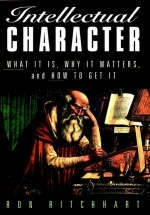
Intellectual Character
Jossey-Bass Inc.,U.S. (Verlag)
978-0-7879-5683-7 (ISBN)
- Titel ist leider vergriffen;
keine Neuauflage - Artikel merken
What does it really mean to be intelligent? Ron Ritchhart presents a new and powerful view of intelligence that moves beyond ability to focus on cognitive dispositions such as curiosity, scepticism, and open mindedness. Arguing persuasively for this new conception of intelligence, the author uses vivid classroom vignettes to explore the foundations of intellectual character and describe how teachers can enculturate productive patterns of thinking in their students. "Intellectual Character" presents illustrative, inspiring stories of exemplary teachers to help show how intellectual traits and thinking dispositions can be developed and cultivated in students to promote successful learning. This vital book provides a model of authentic and powerful teaching and offers practical strategies for creating classroom environments that support thinking.
Ron Ritchhart is research associate at Project Zero, Harvard Graduate School of Education, where he has worked on a number of projects focusing on the development of thinking, understanding, and creativity in schools. He is a recipient of the Presidential Award for Excellence in Teaching Mathematics and of the 1999 2000 Spencer Dissertation Fellowship. Ritchhart is author of several books, including Making Numbers Make Sense, Through Mathematical Eyes, and Pythagora s Bow Tie. He is coauthor and coproducer of the Creative Classroom Series.
List of Tables, Figures, and Exhibits. Foreword: Six Intellectual Characters in Search of an Author (David Perkins). Preface. Acknowledgments. The Author. Part One: The Case for Intellectual Character. 1 Failing at Smart: Or What's an Education For? Where Are We? A Look at the Current State of Teaching. What Are We Teaching For? What Should We Be Teaching For? Moving Forward 2 Rethinking Smart: The Idea of Intellectual Character. Missing the Mark with IQ. Beyond Ability: The Idea of Intellectual Character. Which Dispositions? 3 Acting Smart: How Thinking Dispositions Close the Ability Action Gap. A Disposition in Action. Some Additional Perspectives on Dispositions. A New Model of Dispositions Emerges. Creating Environments that Support the Development of Intellectual Character. From Models to Practice. Part Two: Fostering Intellectual Character in Our Schools. 4 First Days, First Steps: Initiating a Culture of Thinking. Conveying a Sense of the History of Thought and the Power of Ideas. Jumping into a Big Subject Matter Issue. Laying a Foundation for Ongoing Dialogue. Setting an Agenda of Understanding. The Importance of the First Days of School. 5 Thinking Routines: Creating the Spaces and Structures for Thinking. The Form and Function of Routines. Thinking Routines: A Special Type of Routine. Thinking Routines in Action. The Importance of Thinking Routines. 6 Language and Thinking: Prompting, Priming, and Patterning. Learning to Think by Talking. Ways of Talking, Ways of Thinking. The Language of Thinking. The Language of Mindfulness. The Power of Language. 7 Thought Full Environments: Sustaining a Culture of Thinking. Opportunities for Thinking. The Teacher as a Model of Thinking. Classroom Attitudes and Interactions. Making Thinking Visible in the Environment. Identifying the Thought Full Classroom. Part Three: Moving Toward the Ideal of Intellectual Character. 8 Beyond Technique: Where Teaching for Intellectual Character Begins. Exploring Foundations. Sketches of the Teachers. Where It Begins. 9 Three Lessons: What to Keep in Mind About Teaching for Intellectual Character. Lesson One: The Importance of Teachers' Dispositions. Lesson Two: Breaking the Rules of So Called Effective Teaching. Lesson Three: Thinking and Understanding Are a Powerful Mix. In Closing. 10 Some Practical Advice: How to Get Started Teaching for Intellectual Character. Start with Yourself. Enlist Others in the Process. Look at Your Teaching Practice. Take It to the Classroom. Give It Time. In Closing.Appendix. Methodological Notes. Teacher Selection. Classroom Observations. Teacher Interviews. The Repertory Grid Methodology. Reflections and Critique. Notes. References. Index.
| Erscheint lt. Verlag | 16.5.2002 |
|---|---|
| Zusatzinfo | Ill. |
| Verlagsort | New York |
| Sprache | englisch |
| Maße | 158 x 240 mm |
| Gewicht | 567 g |
| Themenwelt | Geisteswissenschaften ► Psychologie ► Allgemeine Psychologie |
| Geisteswissenschaften ► Psychologie ► Pädagogische Psychologie | |
| ISBN-10 | 0-7879-5683-X / 078795683X |
| ISBN-13 | 978-0-7879-5683-7 / 9780787956837 |
| Zustand | Neuware |
| Haben Sie eine Frage zum Produkt? |
aus dem Bereich


